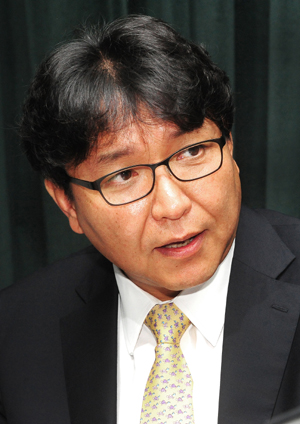Dr. Song's medbiz column
Ajou University Hospital’s regional trauma center officially opened on June 13, which was somewhat belated but definitely meaningful. There works trauma surgeon Lee Cook-jong, who saved the life of Captain Seok Hae-gyun who was in a critical condition after getting multiple gunshots by Somali pirates in early 2011. It is still hard to grasp why it took so many years for the government to allow such a well-known hospital to open a regional trauma center now.
It was in summer, 2000 that I first saw Lee. I was doing a fellowship at the Seoul National University Hospital’s emergency medicine department. Just as fellows usually undertake trivial works of academic associations, I managed the works of the Korean Society of Traumatology then.

While preparing for a KST event of lectures for trauma treatment, I met Lee who was then a fellow at Ajou University Hospital. Choosing trauma surgery as a detailed field in the department of surgery, Lee seemed like a scalpel wielder with madness. As a physician, and as a scalpel wielder, Lee had a great sense of pride. He seemed to have unwavering faith in treating trauma patients that a doctor should do whatever it takes to do to save the life of a patient.
In fact, practitioners regard trauma surgeon as a “3D” job – dirty, dangerous, and difficult. Of course, almost every surgery department is accustomed to all-night operations and emergency situations. However, trauma surgery needs a personal sacrifice. Various kinds of trauma patients pour in at unpredictable times, but they can survive only with proper treatments by professional trauma doctors. To do such noble job, personal sacrifice is a must. In other words, trauma surgery makes a doctor’s life extremely exhausting.
To be honest, I thought Lee’s incredible passion would subside in time when he gets old. However, my prediction was embarrassingly off the mark. To get more training in trauma surgery, he went on a long-term training course in the U.S. and the U.K. Back in Korea, he has kept treating serious trauma patients with his unchanging principles. I have met him several times more via works of the Korean Medical Association, but he has not changed at all. I might sound rude to describe him as an oddball of lunatic energy. However, I chose the expression because ordinary doctors including me would find it almost impossible to be like Lee, who does everything by the book and refuses to conform to the existing system or customs.
Such passionate trauma surgeon is now working at the trauma center that he has eagerly longed for. I believe what he hoped for was to establish an efficient system to treat trauma patients to save more lives, even it required his personal sacrifice.
Lee is not a person to boast his position as the head of the trauma center and finds other easy work than trauma surgery. Just as he did in the past, he will bring in a patient with gushes of blood to an operation room, do an all-night surgery, and fight for patients’ lives in the intensive care unit.
As I lament myself half becoming a bad ass in the medical community, I would like to give Lee my wholehearted support for walking his way and sticking to his guns.
Last but not least, the government should be aware that the more doctors live by the book, the happier the patients get. To help physicians keep their principles, the government should spare no expense in giving legal and systematic resources.

